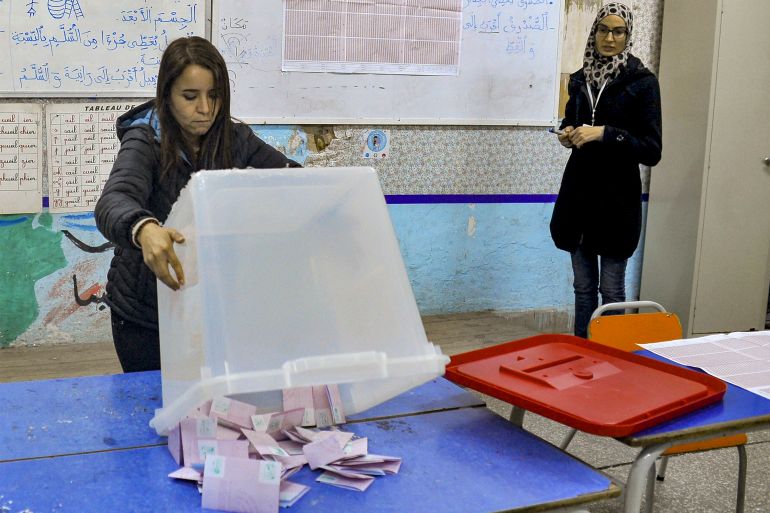Tunisia’s election: The beginning of the end for Saeid
The election, seen as a sham by most in the country, did nothing to defuse the tensions that will likely lead to the downfall of President Kais Saeid’s authoritarian regime.

Tunisia’s December 17 parliamentary election, the first since Tunisian President Kais Saied’s July 2021 power grab turned the country into a de-facto dictatorship, proved to be a sham as expected.
With less than nine percent of eligible voters taking part, Saturday’s electoral theatrics marked not only the death of Tunisia’s once vibrant young democracy but also the official end of the Arab Spring that birthed it.
Keep reading
list of 4 items‘Absolute power’: After pro-China Maldives leader’s big win, what’s next?
Solomon Islands pro-China PM Manasseh Sogavare fails to secure majority
Pro-China party on course for landslide victory in Maldives election
Saied’s regime and its remaining allies are still trying to gaslight the Tunisian public and the international community at large into believing that they have Tunisia’s best interests at heart and that – after a supposedly necessary short break – the democratic process is once again underway in the country.
This weekend, however, Tunisians sent Saied a clear message: They are no longer willing to help him legitimise his authoritarian regime.
For the first time since the 2021 coup, almost all political parties and forces in Tunisia boycotted the election. Furthermore, despite relentless efforts by the formerly Independent High Authority for Elections (ISIE), an overwhelming majority of Tunisian voters refused to go to the polls on Saturday. And crucially, the still-powerful Tunisian General Labour Union (UGTT) announced its decision “to defend rights and freedoms whatever the cost” and described this weekend’s election in particular as a threat to democracy.
The refusal by most Tunisians to participate in the election should not in any way be perceived as voter apathy. Tunisians are still as interested in the future of their country as they have ever been. They had no enthusiasm for this vote because they knew from the very beginning that its outcome would not help better the grave economic and social conditions they are living in.
And Tunisians were not the only ones who refused to participate in this sham.
The European Union, which has long been one of Saied’s strongest allies in the international arena, for example, took the unprecedented decision to not observe the election – a decision which will undoubtedly further the marginalisation, isolation and de-legitimisation of Saeid’s rule. It seems, despite offering a 100 million euro ($106m) grant to the country “to support reforms” in November, the EU has finally decided to distance itself from Tunisia’s undemocratic government.
Saied no longer has a solid ally in the United States either. President Saied’s pre-election meeting with US Secretary of State Antony Blinken in Washington on January 14 – just like several others before it – has not produced the result he was hoping for. The US not only announced its decision to cut its civilian and military assistance to Tunisia by half in 2023, but Blinken emphasised the importance of Saturday’s election being “free and fair” and yet again called for “inclusive reforms to strengthen democratic checks and balances and the protection of fundamental freedoms” in a direct rebuke of Saied’s dismissal of criticism of his power grab and autocratic rule as “fake news” and actions of “foreign forces”.
After Saeid’s failure on Saturday to demonstrate to Tunisians and the world that under his rule Tunisia is still a democracy, the eventual fall of his regime is all but certain.
Now the only question is when – not if – he will go. And the grave economic situation in Tunisia may mean his downfall will be sooner rather than later.
Indeed, the anger Tunisians feel over their economic struggles is reaching levels that was last seen over a decade ago, at the early stages of the Arab Spring. Growing inflation, joblessness, inequality and corruption are once again leading people to believe current political leaders cannot solve the country’s problems and are fuelling revolutionary sentiment.
What makes things even worse for Saied and his cronies is that the International Monetary Fund (IMF) has postponed its authorisation for an urgently needed $1.9bn loan from December 2022 to at least January 2023. This delay amid a gaping deficit and a deepening cost of living crisis will undoubtedly worsen the economic struggles of Tunisians and make their situation even less tolerable. Together with the gradual abolition of bread subsidies and the plans for other substantial public spending cuts, this delay in IMF funding could result in an uprising.
Tunisia, once again, is a bomb ready to explode. And Saturday’s sham election did nothing to defuse it.
The views expressed in this article are the authors’ own and do not necessarily reflect Al Jazeera’s editorial stance.
